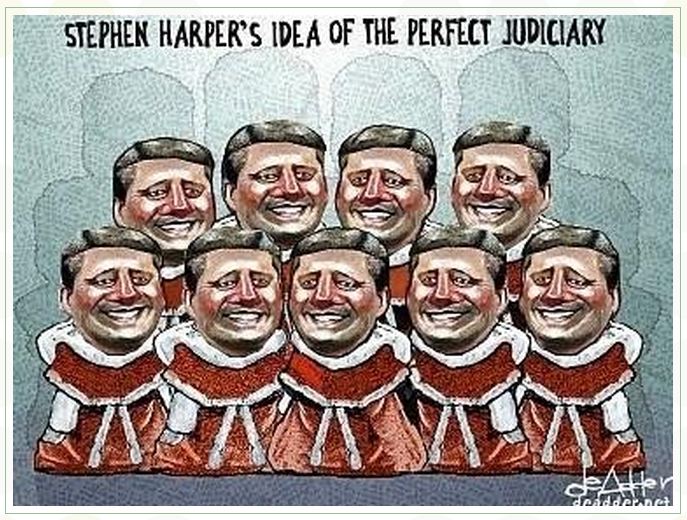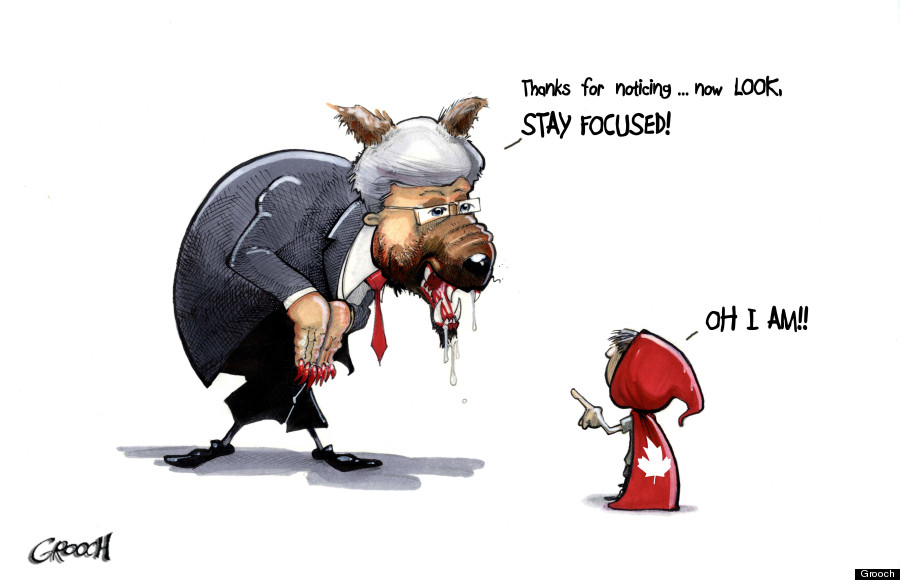White, male lawyers should say ‘no’ to judicial appointments by David Tanovich, February 18, 2015, The Globe and Mail
David M. Tanovich is a law professor at the Faculty of Law, University of Windsor, where he teaches in the areas of criminal law and legal ethics.
The latest round of federal judicial appointments in Ontario has further entrenched inequality in our courts and has led me to think about the following provocative question: Should white male lawyers have an ethical duty to say no the next time the federal justice minister comes calling, in order to force systemic change? In my view, the answer is yes.
It is not an understatement to say that we are in the midst of a crisis of representativeness in our federal judiciary.
For example, since 2012, 46 practising lawyers (including three professors) have been appointed to the Ontario Superior Court of Justice or Court of Appeal by Conservative justice ministers. Just over three quarters (78 per cent) of the appointments have been men (36/46). Only one of the appointments appears to be from a racial minority, although an exact number cannot be discerned because of the government’s refusal to collect this necessary information. Things aren’t much better in the other provinces or in the elevation of judges from the provincial to federal courts.
Despite repeated calls by organizations such as the Canadian Bar Association, Indigenous Bar Association, Canadian Association of Black Lawyers, South Asian Bar Association and the Federation of Asian Canadian Lawyers, academics and lawyers for more representativeness in appointments, and thoughtful recommendations to accomplish that end, the government of Stephen Harper refuses to act.
It continues to demonstrate what University of Ottawa professor Rosemary Cairns Way has referred to in a recent paper as “deliberate disregard” for representativeness. This “deliberate disregard” has serious consequences in individual cases for accurate fact-finding and law reform and, more systemically, for the legitimacy, fairness, impartiality and repute of the administration of justice. [Isn’t that Harper’s desired outcome?]
A drastic solution is needed, and one would be to place an ethical obligation on white male lawyers to say no. [In a misogynistic society, notably with a government taking Canada back into the dark ages, how many “white male lawyers” would turn down such offers of power?]
Lawyers act in the public interest and we serve as important guardians of the administration of justice and the rule of law. [Really? Not in Ernst’s experiences as a civil litigant in Canada’s legal system, with the most disrespectful and anti-public-interest lawyers so far, being judges!]
Indeed, lawyers have professional obligations to “encourage public respect for and try to improve the administration of justice.”
[Like this? AER lawyer Glenn Solomon giving legal advice to Brent O’Neil about frac harms suffered by his mother, Ann Craft, at Ponoka, Alberta:
Lawyers have responsibilities that distinguish us from others. As our Rules of Professional Conduct exhort, “a lawyer has special responsibilities by virtue of the privileges afforded the legal profession and the important role it plays in a free and democratic society and in the administration of justice, including a special responsibility to recognize the diversity of the Ontario community …”
Lawyers also have a professional responsibility to take measures to prevent discrimination. The appointments process is clearly producing discriminatory results by denying opportunities to all equality-seeking groups in Canada. It is unfortunate that it appears to have come to this.
Judicial appointments are considered by many to be the pinnacle of one’s legal career, and come with tremendous financial rewards and security.
Lawyers who apply to the bench want to make a difference and meaningfully contribute to the administration of justice. There is no question that saying no would be hard to do and a lot to ask. But as lawyers we are regularly faced with difficult and challenging ethical decisions. [Like AER lawyer Glenn Solomon defaming Ernst in a legal filing, naming her a terrorist without any evidence, and saying Charter rights of terrorists can be violated with Justice Wittmann ruling there is no evidence of Ernst being a terrorist, “absolutely none,” and saying publicly that lawyers must not lie, but ordering Ernst to pay Solomon’s costs? ] Many of them come with personal and financial costs.
Sadly, nothing else seems to have a chance of changing the status quo, for it is clear that the Harper government does not care; or worse, it appears to actually want to have a judiciary that reflects the face and ideology of its base.
Lawyers, and in particular, white male lawyers can make a difference on this issue. And so we should. [Emphasis added]
2015 01 02: Judging Mr. MacKay
Re Judging Judges (letters, Jan. 1): I never felt that reading The Globe and Mail’s editorial page over breakfast might be dangerous to my physical well-being.
That is, until I read Justice Minister Peter MacKay’s letter to the editor about an article in your newspaper that he suggests undermines confidence in Canada’s judicial system (Appointments Of Judges Favour Prosecutors Over Defence – Dec. 29). This from a member of the cabinet that drew international condemnation for attacking the country’s Chief Justice?
There was more.
Reading Mr. MacKay’s opinion that judges who were former prosecutors would not be tougher on an accused than former defence lawyers, I choked on my corn flakes. And while I have no doubt that Canada’s judges act “openly and impartially,” seeing the phrase employed by a member of Stephen Harper’s cabinet caused me to guffaw loud enough to frighten our cat.
But when the minister signed off with the Fox News slogan, I howled so hard, I risked falling on the floor and cracking a rib or two. Please preface similar letters from the minister with an appropriate warning.
John Lawrence Reynolds, Burlington, Ont.
………
The integrity of the judges is not impugned, the integrity of the government appointing them is the issue.
Linda Hume-Sastre, St. Catharines, Ont. [Emphasis added]
[Refer also to:
2015 01 13: Peter MacKay’s friends, colleagues make up 6 of 9 judge appointees, Many recent members of Nova Scotia judiciary have political, professional or personal ties to MacKay
2014 07 03: Do Peter MacKay’s claims about female judges hold water? Includes ratings by The Canadian Press Baloney Meter
‘If our goal is to reach parity, then we’re not going in the right direction’
2014 06 19: MacKay compared to paternal 1950s TV characters with female judge comments
In the past five and a half years, Ottawa appointed just a handful of non-white judges out of the nearly 200 first-time justices it has named to the bench.
Arlene Huggins, president of the 300-member Canadian Association of Black Lawyers, said she asked Mr. MacKay at the meeting what is being done, or could be, to address the lack of diversity on the bench. … Ms. Huggins said Mr. MacKay is “blaming the victim” by saying visible minorities do not apply: “Let him release the data.” She and others said they have been told people in minority communities are applying. She said Mr. MacKay did not address her question about what is being done or could be done to make the bench reflect society better.
“If you aren’t tracking it, it’s very difficult to identify an issue and how to make it better,” said Esi Codjoe, a Toronto lawyer.
The Office of the Commissioner for Federal Judicial Affairs does not keep track of the numbers of visible minorities appointed. When asked why not, a spokesman said it would need to be directed to do so by the justice minister.
But the office does track the number of female judges: 382 out of 1,120 – 34 per cent – on federally appointed courts such as provincial superior and appeal courts, the Federal Court and the Tax Court of Canada.
In the past five and a half years, only a few of the nearly 200 first-time justices Ottawa appointed were not white, according to research by University of Ottawa law professor Rosemary Cairns Way (who studied the past two years) and separately by The Globe and Mail (which looked at the previous three and a half years). At the provincial court level in Ontario, about 11 per cent of a sample of 138 judges were visible minorities, while 15 per cent of lawyers are visible minorities, according to research by Ryerson University.
In the House of Commons on Thursday, opposition MPs likened Mr. MacKay to the paternal characters in the TV shows Leave It To Beaver and Father Knows Best.
2014 06 18: Peter MacKay tries to explain lack of diversity on federal courts
When asked about the dearth of women and visible minorities on federally appointed courts, Justice Minister Peter MacKay stunned several lawyers at a meeting in Toronto when he said they just “aren’t applying” for the jobs.


